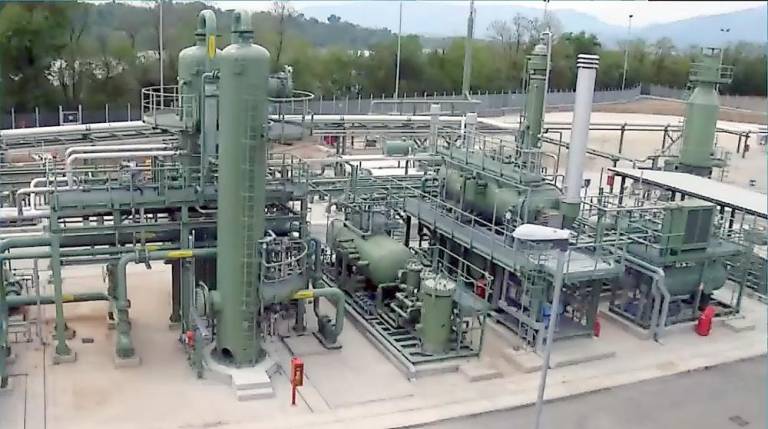Tennessee Gas finally shows up: This time, compressor expansion gets only praise
Wantage. Advocates say the project will bring good jobs and reliable energy to the region without polluting the environment.

After missing a meeting earlier in the summer, a Tennessee Gas Pipeline Co. representative made it to the Sussex County Commissioners’ meeting to address the public’s concerns about a compressor station upgrade in Wantage Township.
Three out-of-area representatives on Sept. 8 spoke in favor of the project, and no one spoke out against it. Advocates said the project will bring good jobs and reliable energy to the region without polluting the environment. At previous meetings, members of the public objected to the project’s potential environmental hazards and noise pollution.
In June 2020, Tennessee Gas proposed its East 300 Upgrade, a new 20,500-horsepower compressor at 164 Libertyville Road in Wantage that will triple the size of the existing compressor.
The pipeline sends methane gas harvested from the Marcellus Shale through Pennsylvania and into New Jersey through Sussex, Passaic, and Bergen counties before it reaches its destination in Westchester County, N.Y., where it will be used by Con Edison.
Daniel Maxian, director of project management for Kinder Morgan, parent company of Tennessee Gas, said the upgrade will increase the operating area of the compressor station to 12.69 acres, up from the current 5.75 acres.
About 80 acres of trees will provide a buffer between the upgraded compressor and neighboring residents, he said.
He also said there will be minimal tree clearing on the site, no direct impact to streams, freshwater wetlands, and other water bodies. Maxian said the project will have no impact on migratory birds, sensitive species, or habitats.
“So, one of the things that we really work to do when we expand our existing infrastructure is to look to site our equipment in areas that really avoid or minimize environmental impacts,” Maxian said.
He said the project will create more than 40 jobs in New Jersey during construction, along with associated economic benefits.
Dave Fiori, a representative of the International Brotherhood of Electrical Workers 102, said the project will give 250 of its Sussex County members a rare chance to work in their home county.
“We feel that this job is going to be able to provide good decent jobs, jobs that pay a living wage with benefits, the benefits that our members have come to rely on,” he said. “With the reliability that this project brings to the gas network in the region. We feel it’s a win-win for everybody. And on behalf of all that the building trades we hope that there’s some strong support for this project and that we can see it come to fruition.”
Tennessee Gas Pipeline pays more than $334,000 in taxes, and the new facility will add an additional $105,146 in property taxes. Maxian pointed to a report by the Rutgers Edward J. Bloustein School of Planning and Public Policy suggesting the project could bring in about $400,000 in additional local tax revenues.
Maxian said the Rutgers report indicated that compressor stations haven’t had any impact on surrounding home values. The upgraded facility will have state-of-the-art safety and control systems, he said.
“With new infrastructure and with state of the art, facilities comes reliability, and you get increased raw ability get increased access to natural gas supplies in the region,” he said.
Controlled venting
The facility will operate entirely above ground. Tennessee Gas is complying with all of its permits, Maxian said.
At some point, however, Tennessee Gas will have to vent natural gas into the air.
“Now, that’s done in a controlled method,” Maxian said. “And we do that in a way to minimize the amount of gas that we are releasing. We’re in the business of transporting gas in our pipeline. We’re not in the business of venting get gas to atmosphere. So, we don’t want to vent more than we need to. And as part of this project, we are proposing a couple of updated technologies to go along with our blowdown systems.”
The blowdown system comes with a new silencer that will limit noise. Since natural gas is lighter than air, Maxian said, it will dilute and travel away from the side. In an emergency, he said, the compressor is designed to shut itself down.
“We design our system to be smart, we designed it to be adaptable and redundant, so that when we see operational parameters that start to look a little, you know, like they’re approaching the limits of their safe operating parameters, we slow the compressor down.” he said. “We see this information in real time.”
Commissioners Director Dawn Fantasia reminded the public that the county has authority to approve or reject the upgrade. That authority resides with the Federal Energy Regulatory Commission and the state of New Jersey, which issues permits.
“We feel that this job is going to be able to provide good decent jobs, jobs that pay a living wage with benefits, the benefits that our members have come to rely on,” he said. “With the reliability that this project brings to the gas network in the region. We feel it’s a win-win for everybody. And on behalf of all that the building trades we hope that there’s some strong support for this project and that we can see it come to fruition.”